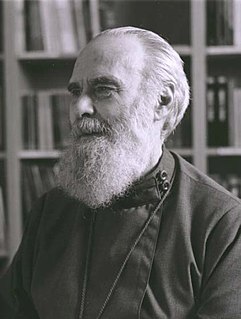A Quote by Charles Spurgeon
Prayer and praise are the oars by which a man may row his boat into the deep waters of the knowledge of Christ.
Related Quotes
Praise and Prayer PRAISE is devotion fit for mighty minds, The diff'ring world's agreeing sacrifice; Where Heaven divided faiths united finds: But Prayer in various discord upward flies. For Prayer the ocean is where diversely Men steer their course, each to a sev'ral coast; Where all our interests so discordant be That half beg winds by which the rest are lost. By Penitence when we ourselves forsake, 'Tis but in wise design on piteous Heaven; In Praise we nobly give what God may take, And are, without a beggar's blush, forgiven.
It is obvious that Paul did not regard prayer as supplemental, but as fundamental-not something to be added to his work but the very matrix out of which his work was born. He was a man of action because he was a man of prayer. It was probably his prayer even more than his preaching that produced the kind of leaders we meet in his letters.
When a man sought knowledge, it would not be long before it could be seen in his humbleness, his sight, upon his tongue and his hands, in his prayer, in his speech and in his disinterest (zuhd) in worldly allurements. And a man would acquire a portion of knowledge and put it into practice, and it would be better for him than the world and all it contains - if he owned it he would give it in exchange for the hereafter.
If a man is crossing the river and an empty boat collides with his skiff, even though he is a bad tempered man he will not become very angry. But if he sees a man in the other boat he will scream and shout and curse at the man to steer clear. If you can empty your own boat crossing the river of the world, no one will oppose you, no one will seek to harm you. Thus is the perfect man - his boat is empty.
The Psalter is the prayer book of Jesus Christ in the truest sense of the word. He prayed the Psalter and now it has become his prayer for all time...we understand how the Psalter can be prayer to God and yet God's own Word, precisely because here we encounter the praying Christ...because those who pray the psalms are joining in with the prayer of Jesus Christ, their prayer reaches the ears of God. Christ has become their intercessor.
We have no knowledge, that is, no general principles drawn from the contemplation of particular facts, but what has been built up by pleasure, and exists in us by pleasure alone. The Man of Science, the Chemist and Mathematician, whatever difficulties and disgusts they may have had to struggle with, know and feel this. However painful may be the objects with which the Anatomist's knowledge is connected, he feels that his knowledge is pleasure; and where he has no pleasure he has no knowledge.
It is God's earth out of which man is taken. From it he has his body. His body belongs to his essential being. Man's body is not his prison, his shell his exterior, but man himself. Man does not "have" a body; he does not "have" a soul; rather he "is" body and soul. Man in the beginning is really his body. He is one. He is his body, as Christ is completely his body, as the Church is the body of Christ
The Prophet introduced a system of prayer in that it was interwoven into man's daily work: a prayer in the morning when he arose from his bed; a prayer at lunch time, as an indication that if his body needed a diet, so did his spirit; a prayer in the afternoon when he retired from his daily work; a prayer at sunset and a prayer when going to bed.




































